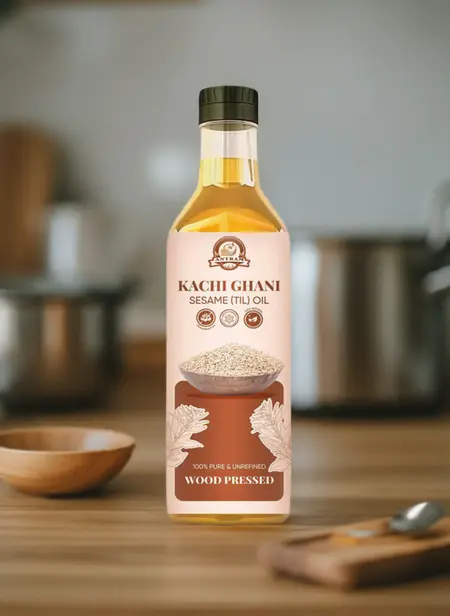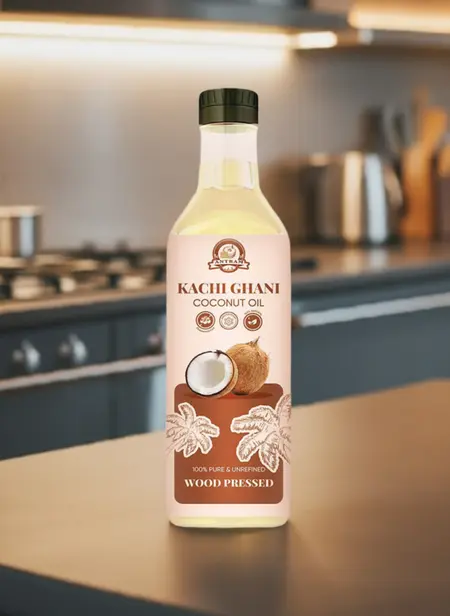In recent times, there has been a growing awareness about the importance of consuming whole grains and flours that retain their natural nutrients. Among the many methods of flour production, cold pressing is emerging as one of the healthiest due to its nutrient preservation. But what exactly makes cold-pressed atta superior to other flours, especially when compared to high-speed steel-mill ground flours? The answer lies in the RPM (rotations per minute) involved in the grinding process and the impact this has on nutrient retention.
What is Cold Pressed Atta?
Cold-pressed atta is produced by grinding grains at a low RPM using traditional stone grinders. The process generates minimal heat, ensuring that the natural nutrients in the grains remain intact. The flour is ground slowly, at 100 to 200 RPM, which is key to maintaining its natural health benefits.
Nutrient Elements in Cold Pressed Atta
Cold-pressed atta retains all the essential nutrients present in the grain, making it a much healthier option compared to refined or steel-milled flours. Some of the critical nutrient elements found in cold-pressed atta include:
- Fiber: Cold pressing ensures that the outer bran layer remains intact, which is rich in fiber. This fiber is crucial for digestion and helps in regulating blood sugar levels.
- Vitamins: Vital vitamins like B1 (thiamine), B3 (niacin), and B6 are preserved during cold pressing. These vitamins play an essential role in energy metabolism and nerve function.
- Minerals: Cold-pressed atta is rich in minerals like iron, magnesium, and zinc, which are often lost in the modern milling process. These minerals are vital for blood health, muscle function, and immune system support.
- Healthy Fats: Cold pressing retains the natural oils present in the grain germ. These oils are rich in healthy fats and antioxidants, which help improve heart health and reduce inflammation.
- Protein: The slow grinding process keeps the protein content of the grain intact. Protein is essential for muscle repair, immune function, and overall cellular health.
The Role of RPM in Flour Milling
RPM (Rotations Per Minute) refers to the speed at which the grinding mechanism (either a stone grinder or a steel mill) operates. This speed has a significant impact on the temperature generated during the grinding process, which in turn affects the nutritional value of the flour.
- Cold Pressing (100 to 200 RPM): In cold pressing, the grains are ground slowly at a low speed, generally between 100 to 200 RPM. This process generates very little heat, typically below 40°C (104°F). The low temperature ensures that the nutrients—vitamins, minerals, healthy fats, and enzymes—remain intact, preserving the natural goodness of the grain.
- Steel Mill Grinding (1400 RPM or Higher): In contrast, modern steel roller mills operate at 1400 RPM or higher. This high-speed grinding generates a significant amount of heat, which can raise the temperature of the flour up to 90°C (194°F) or more. The higher the RPM, the more heat is produced, and this heat damages the grain’s delicate nutrient profile. Vitamins, antioxidants, and healthy oils can break down under such high temperatures, reducing the overall nutritional value of the flour.
Why High-Speed Steel-Milled Flour is Less Nutritious
- Nutrient Loss: The high temperature generated during high-speed milling breaks down important nutrients like vitamin E and B-complex vitamins. These nutrients are highly sensitive to heat and oxidation, meaning much of their benefits are lost in the steel milling process.
- Refinement and Bleaching: High-speed milling often involves further refinement of the flour, where the bran and germ are removed. These components contain most of the fiber, vitamins, and minerals. Many steel-milled flours are also bleached to improve shelf life, which further strips away essential nutrients.
- Lack of Healthy Oils: The natural oils found in the germ of the grain are destroyed during high-speed milling due to the heat. These oils contain healthy fats that are beneficial for heart health. Cold-pressed atta, on the other hand, preserves these oils, making it a more wholesome and balanced food.
- Reduced Digestibility: The heat generated during high-speed milling alters the grain’s molecular structure, making it harder to digest. Cold-pressed atta, with its retained fiber and unprocessed nature, is easier to digest and promotes gut health.
Why Cold Pressed Atta is Healthier
- Minimal Heat, Maximum Nutrition: Grinding grains at low RPM ensures that minimal heat is generated. This helps in preserving all essential nutrients, including the grain’s natural oils, vitamins, and antioxidants. The cold-press method guarantees that you’re getting flour in its most natural and unaltered form.
- Higher Fiber Content: Cold-pressed atta contains a high amount of fiber due to the inclusion of the grain’s bran. This fiber is crucial for maintaining healthy digestion and reducing the risk of chronic diseases like heart disease and diabetes.
- Longer Shelf Life Without Preservatives: Because cold pressing retains the natural oils and nutrients of the grain, there’s no need for artificial preservatives. Fresh cold-pressed atta from brands like Antram Foods is made to order, ensuring that the flour is pure and has a longer shelf life without compromising health.
- No Hidden Additives: Unlike many high-speed milled flours, cold-pressed atta contains no added maida (refined flour) or bleaching agents. You get 100% pure, natural flour with every batch.

Conclusion: Cold Pressed Atta for a Healthier Future
The low RPM involved in the cold pressing of atta ensures the retention of nutrients, making it a far superior option for health-conscious consumers. In contrast, high-speed steel-milled flour may offer convenience but at the cost of nutrient loss, lack of fiber, and the potential inclusion of harmful additives.
By choosing cold-pressed atta from a trusted brand like Antram Foods, you are opting for flour that not only retains its natural nutritional value but also supports sustainable and traditional food production methods. We offer range of cold pressed freshly made flours like MP Whole Wheat Atta Cold Pressed , Multigrain Atta Cold Pressed , Gluten Free Millet Atta Cold Pressed
Make the switch today, and give your body the nutrition it deserves!






Leave a comment